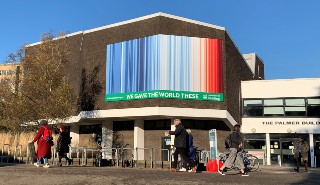University of Reading’s climate education scheme achieves major milestone
More than 100 individuals have signed up to become Climate Ambassadors in partnership with STEM Learning and the University of Reading.
The milestone has been reached less than a year after the scheme – which offers crash courses in climate change issues, among other support, for teachers and education leaders – was launched in April 2022.
So far, 115 climate change and sustainability experts from across the country – including here at Reading – have signed up as ambassadors through the online platform hosted by STEM Learning, making them available to provide free advice to the hundreds of registered schools and organisations.
This means more schools are being supported to reach net zero and make their buildings more resilient to extreme weather, more students are learning about the impact of global warming and the role they can play in mitigating this, and more teachers are being provided with the latest climate science to incorporate into lessons across all subjects.
The scheme has so far reached more than 37,000 people at 249 schools and organisations. Some 240 activities have been completed in 822 hours of activity, figures up to December 2022 show.
Professor Andrew Charlton-Perez, the University of Reading climate scientist who led the scheme’s creation, said: “This landmark achievement marks the latest step in the University’s mission to share its climate change expertise with the world.
“From the beginning we’ve said we want to offer more than just school assemblies and we’ve done that by helping share expertise with schools and colleges across a wide variety of subjects that will arm the next generation with the knowledge they need to confront climate change. This includes teacher training days, offering practical solutions to school leaders on cutting carbon emissions, and even offering safety advice during periods of extreme weather.
“It’s reassuring and humbling to know so many leaders in our local community are committed to tackling climate change head-on. A huge thank you to all our colleagues across the country who have signed up to and supported the scheme. If you have climate expertise and want to help schools and colleges deliver the climate education which is so desperately needed, please sign up. A small amount of your time could make a huge difference to many, many young people.”
Action Plan
The scheme was the first project launched as a result of the University’s Climate Education Action Plan, which features 9 priorities, after it was unveiled at COP26 in November 2021. It was developed following a major Climate Education Summit hosted in September 2021 by Reading with partners including the Met Office and the Royal Meteorological Society.
The Climate Ambassadors milestone comes as the Royal Meteorological Society’s Head of Education, Professor Sylvia Knight, has been appointed a Visiting Professor at the University, jointly in the School of Mathematical, Physical and Computational Sciences and the Institute for Education.
Professor Knight said: “I am truly honoured to be appointed as Visiting Professor at the University of Reading – some 20 years after I worked there first as a PhD student and then in postdoctoral research.
“Through my joint appointment, I hope to support the excellent work the University is already doing to promote and improve the teaching of climate change in UK schools and colleges, exploring the opportunities in all subject areas to better equip our young people for the green jobs, challenges and opportunities of the future.”
Trainee teacher education
In another show of Reading’s desire to spread its knowledge, the University’s Institute of Education has developed a framework that ensures all trainee teachers have free access to training that empowers them to incorporate climate education within their teaching.
The Climate and Sustainability Initial Teacher Education (ITE) Framework is currently being piloted with a full roll-out to follow.
Through their training, teachers will learn about:
● What is happening to our climate and how to develop sustainable thinking in children
● Climate justice and the impact of extreme weather on vulnerable communities
● How to translate climate knowledge into action

